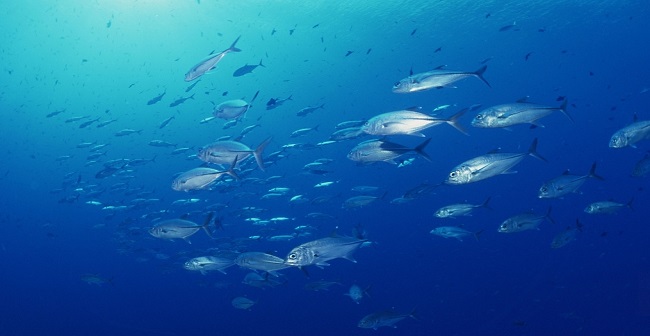
The world's oceans will likely lose about one-sixth of their fish and other creatures within 100 years if climate change continues on its current path. These are the findings of a wide-reaching, computer-based study by an international team of marine biologists.
Every degree Celsius that the world's oceans warm, their biomass — or the total weight of all the marine animal life — is expected to drop five percent, the study also found. The study predicts that if there is no change in the rate of worldwide greenhouse gas production, there will be a 17-percent loss of biomass by the year 2100. But, if the world reduces carbon pollution, biomass losses could be limited to only about 5 percent.Marine biologist Boris Worm, who helped run the study, added that the building blocks of marine life — plankton and bacteria — may decline less heavily. Those marine animals that we use directly, and care about most deeply, are predicted to suffer the most, said Worm. He works at Canada's Dalehousie University. University of Victoria biology professor Julia Baum was not part of the study, but she said the findings make sense. She noted that the possible effects of the predicted losses of animal life are huge.
本时文由奇速英语国际教育研究院提供,未经书面授权,禁止复制和任何商业用途, 版权所有,侵权必究!(作者投稿及时文阅读定制请联系微信:400-1000-028)
1.Which of the following may the international team of marine biologists disagree?
A The possible effects of the predicted losses of animal life are huge.
B Those marine animals that we use directly are predicted to suffer the least.
C The world's oceans will likely lose about one-sixth biomass within 100 years.
D Climate change also produces oceans that are more acidic and have less oxygen.
解析:选B。推理判断题。根据文章第四段第二句Those marine animals that we use directly, and care about most deeply, are predicted to suffer the most, said Worm.可知,那些我们直接使用、最关心的海洋动物,预计将遭受最大的痛苦,故选B。
2.What can we learn from the second and third paragraph?
A William Cheung says greenhouse gas production is the biggest issue.
B If the world reduces carbon pollution, biomass losses will be 17 percent by 2100.
C The building blocks of marine life — plankton and bacteria may increase heavily.
D Every degree Celsius the world's oceans warm, the biomass is expected to drop five percent.
解析:选D。细节理解题。根据文章第二段第一句Every degree Celsius that the world's oceans warm, their biomass — or the total weight of all the marine animal life — is expected to drop five percent, the study also found.可知,全球海洋温度每升高一摄氏度,其生物量,或者说所有海洋动物的总重量,预计就会下降5%,故选D。
3.The underlined word “This” in Paragraph 3 refers to _______.
A climate change
B plankton and bacteria
C warming temperature
D more acidic and less oxygen
解析:选D。词义猜测题。根据文章第三段第四及五句But climate change also produces oceans that are more acidic and have less oxygen. This also harms sea life.可知,气候变化也会导致海洋酸化程度更高,含氧量更少,而海洋酸化程度更高和含氧量更少也损害了海洋生物,故选D。
4.The passage mainly tells us ______.
A ocean warming may greatly reduce sea life
B marine biologist Boris Worm helped run the study
C much of the world depends on the oceans for food or work
D biology professor Julia Baum said the findings make sense
解析:选A。主旨大意题。根据全文可知,文章介绍了科学家们预计海洋变暖可能会大大减少海洋生物,故选A。